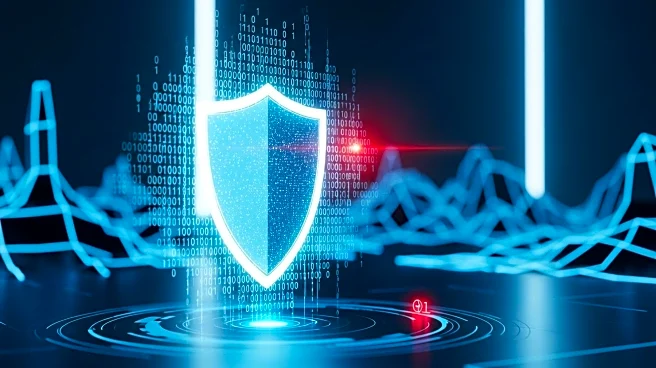What is the story about?
What's Happening?
South Korea is experiencing a series of cybersecurity breaches, with significant incidents occurring almost monthly throughout 2025. These breaches have affected various sectors, including credit card companies, telecoms, tech startups, and government agencies. The North Korea-linked hacking group Kimsuky has been identified as a key perpetrator, using AI-generated deepfake images in attacks against South Korean organizations. The fragmented nature of South Korea's cybersecurity infrastructure, with multiple government ministries and agencies working in silos, has been criticized for its slow and uncoordinated response to these threats. The lack of a centralized 'first responder' agency has further complicated efforts to defend against cyberattacks.
Why It's Important?
The ongoing cybersecurity breaches in South Korea highlight vulnerabilities in the nation's digital infrastructure, which could have significant implications for its economy and national security. The repeated attacks underscore the need for a more cohesive and proactive cybersecurity strategy. The breaches not only threaten the personal data of millions of South Koreans but also pose risks to critical national infrastructure. The situation calls for urgent reforms to improve coordination among government agencies and to develop a skilled cybersecurity workforce. Failure to address these issues could lead to further economic and security challenges, affecting both domestic and international stakeholders.
What's Next?
In response to the surge in cyberattacks, the South Korean Presidential Office's National Security is advocating for a comprehensive, cross-ministerial effort to strengthen the country's cyber defenses. This includes implementing new legal measures to allow government intervention at the first sign of hacking. However, there are concerns about potential overreach and politicization if too much power is centralized. A balanced approach, with a central body for strategy and independent oversight, is suggested to ensure effective and accountable cybersecurity management. The Ministry of Science in ICT, along with other agencies, is committed to addressing these threats and minimizing harm to businesses and the public.
Beyond the Headlines
The persistent cyber threats facing South Korea may lead to long-term shifts in how the country approaches digital security. The need for a more integrated and strategic response could drive policy changes and investments in cybersecurity infrastructure. Additionally, the involvement of North Korea-linked groups in these attacks highlights the geopolitical dimensions of cyber warfare, potentially influencing diplomatic relations and regional security dynamics. As South Korea seeks to bolster its defenses, it may also play a more active role in international cybersecurity collaborations.















